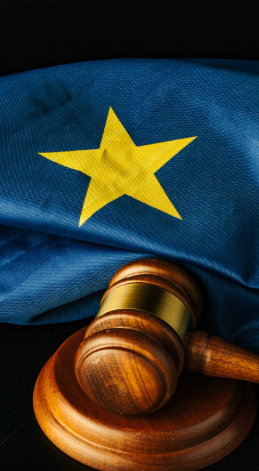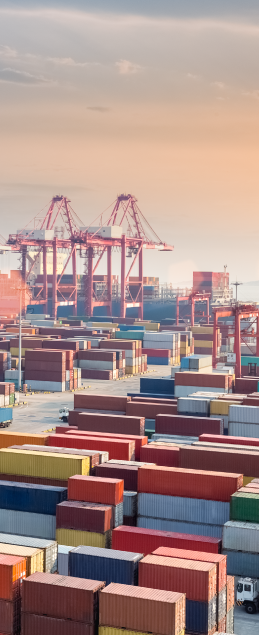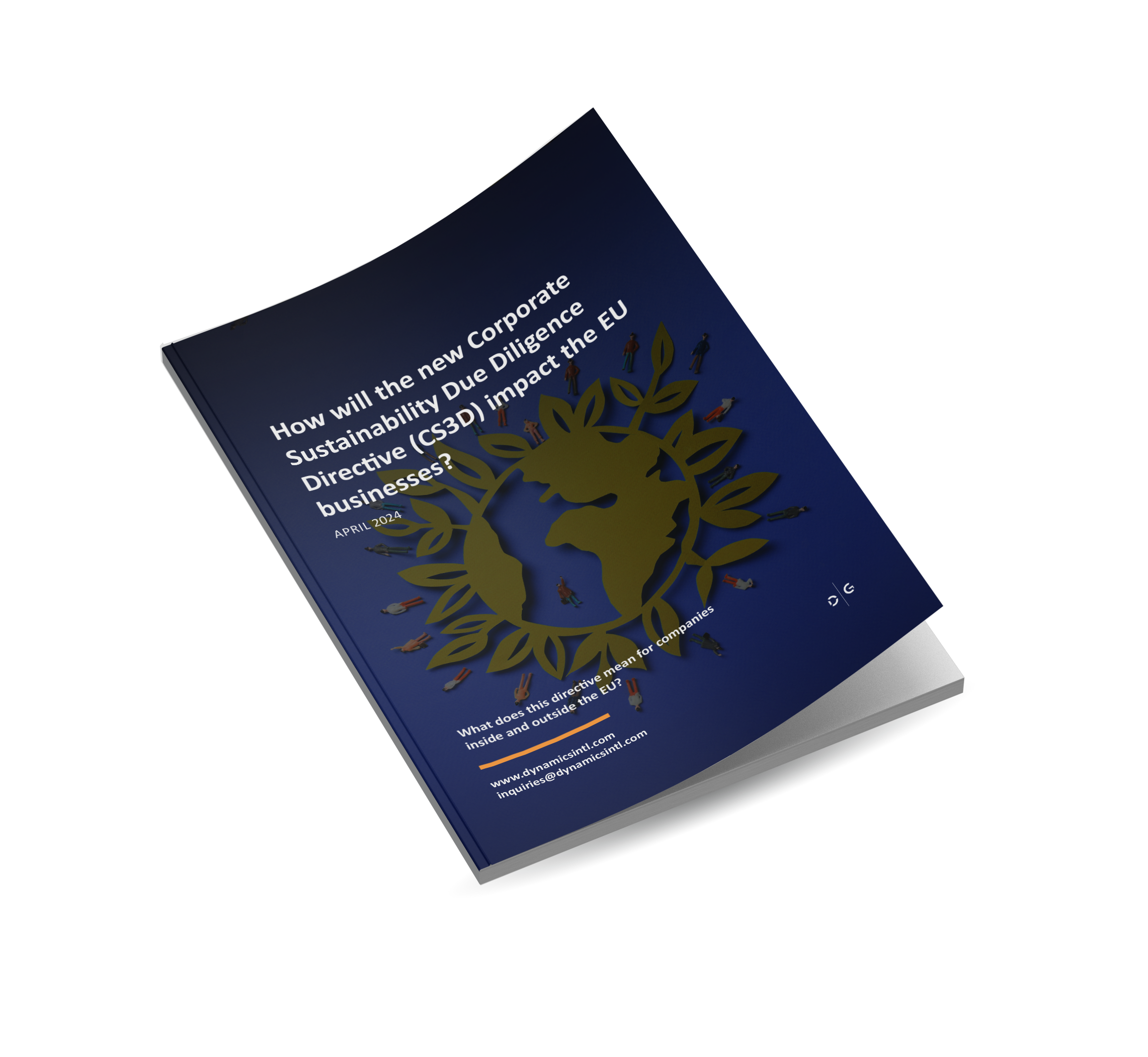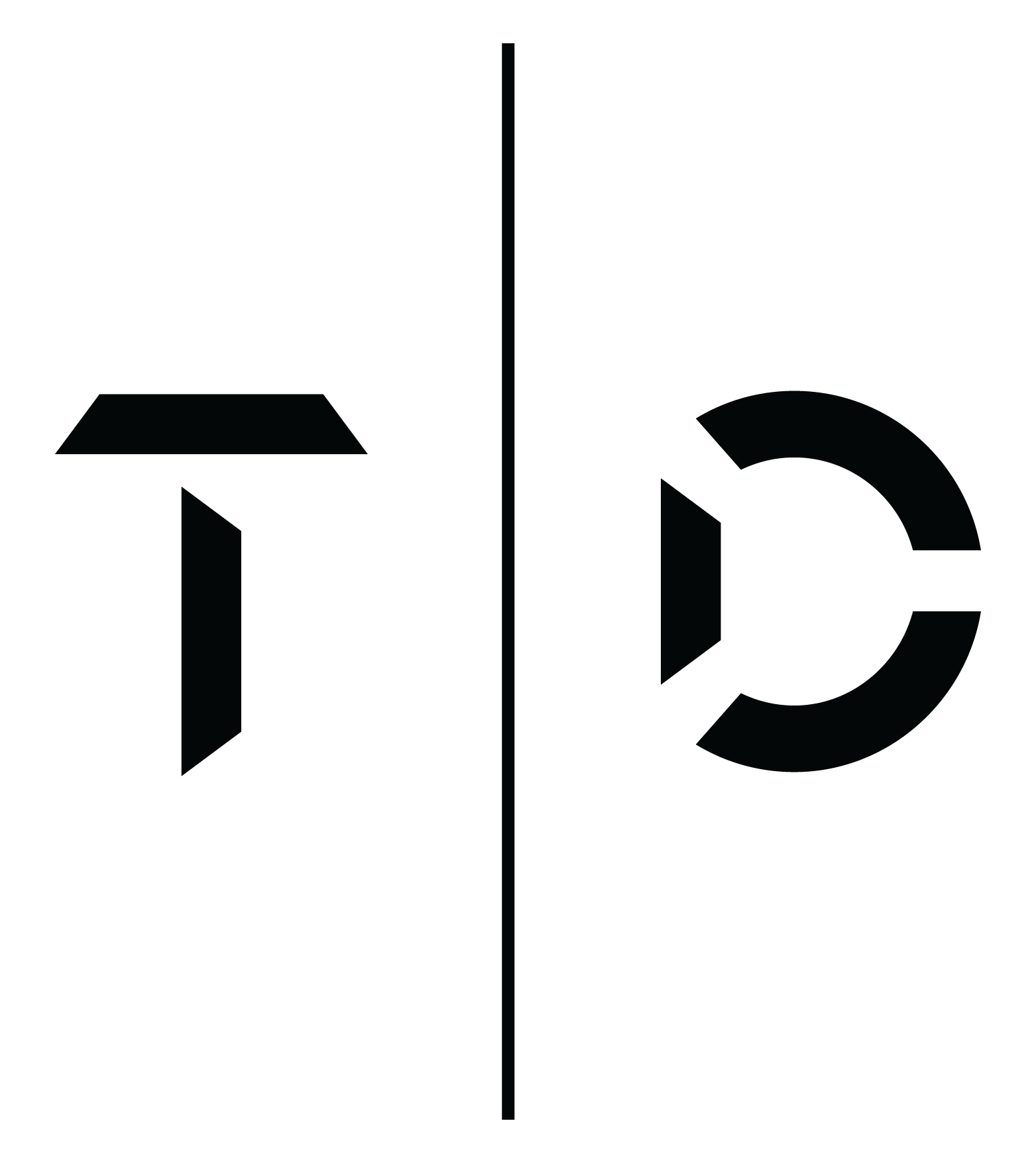Listen to the article – How will the new Corporate Sustainability Due Diligence Directive (CS3D) impact the EU businesses?
The Corporate Sustainability Due Diligence Directive (CS3D) was agreed at a political level in December 2023 and confirmed by Committee of the Permanent Representatives of the Governments in an amended version on 15 March 2024. It is scheduled to be voted in a plenary session between 22-25 April. Usually at this stage of the process, the adoption by other countries is considered merely a formality, so it is justified to try and assess what this directive means for companies inside and outside the EU.
The concept of human rights due diligence was first specified and further developed by the Organization for Economic Cooperation and Development’s Guidelines for Multinational Enterprises[1] which extended the application of due diligence to environmental and governance topics.
At an EU level, sustainable corporate governance has so far been mainly fostered indirectly by imposing reporting requirements on approximately 12,000 companies around environmental, social, and human rights related risks, impacts, measures (including due diligence) as well as policies in the Non-Financial Reporting Directive (NFRD).[2]
The European Commission proposal for a Corporate Sustainability Reporting Directive (revision of NFRD)[3] extends the scope of the companies covered and strengthens the standardization of reported information. The directive, however, is not designed to impose material duties on companies other than public reporting requirements, but it is highly likely this would not be the case.
How can we help?
Intelligence Solutions
The combination of business, market and strategic intelligence ensures result-driven outcomes for our customers.
Strategic Advisory
The first step in protecting your organization, assets and people is the identification of the risks and threats.
There are about 13.7 million limited liability companies (LLCs) in the EU. Out of this number, 76,000 limited liability companies are classified as large. Looking at these large LLCs more closely, around 23,200 companies have more than five hundred employees with a turnover above EUR 350 million. Moreover, approximately 9,400 LLCs have more than five hundred employees and a turnover above EUR 150 million, and about 8,900 LLCs have more than one thousand employees. Furthermore, there are around 3,250 EU-based LLCs that have shares listed in the EU.
The European Commission estimate is that around 13,000 EU companies will be within scope of the Diligence Directive. Additionally, the directive is expected to affect in the region of 4,000 non-EU companies.[4] This new directive will have considerable impact on a number of EU companies as well as non-EU companies operating in the EU, including on their value chains globally.
This report will lay out a brief review of the content of the directive, and its impact considering five aspects: labor, structure, supply, budgets, and contractual agreements with subsidiaries. In the end, it will try to give a brief overview of similar existing national legislation in other EU member-states, as well as recommendations and conclusions.
01
Directive Digest
01
Directive Digest
The directive mandates compliance from companies based on predetermined criteria, encompassing entities formed under EU member-state legislation that must satisfy stringent conditions regarding their size and financial performance, as well as those formed under third-country legislation, which must meet prescribed turnover thresholds within the Union.
- Companies formed in alignment with EU member-state legislation must meet either of the subsequent conditions. Entities employing over 500 personnel on average and possessing a net global turnover exceeding EUR 150 million in the most recent financial year with prepared annual financial statements.
- Alternatively, entities not meeting the above thresholds but maintaining over 250 employees on average and a net worldwide turnover surpassing EUR 40 million in the last financial year with prepared annual financial statements, provided at least 50% of this turnover originated from specified sectors such as textile, leather, and related product manufacturing (including footwear), and wholesale trade of textiles, clothing, and footwear; agriculture, forestry, fisheries (including aquaculture), food product manufacturing, and wholesale trade of agricultural raw materials, live animals, wood, food, and beverages; mineral resource extraction (including crude petroleum, natural gas, coal, metals, and non-metallic minerals), basic metal product manufacturing, other non-metallic mineral product manufacturing, fabricated metal product manufacturing (excluding machinery and equipment), and wholesale trade of mineral resources, basic and intermediate mineral products.
- Additionally, the directive extends to companies formed under non-EU third-country legislation, meeting one of the subsequent conditions: Achieving a net turnover exceeding EUR 150 million in the Union during the financial year preceding the last financial year; Achieving a net turnover between EUR 40 million and EUR 150 million in the Union during the financial year preceding the last financial year, provided at least 50% of its global turnover originated from the specified sectors. Mandatory provisions within the directive include integration of due diligence into company policies, identification of actual or potential adverse impacts, prevention and mitigation of potential adverse impacts, cessation of actual adverse impacts, and minimization of their extent, establishment and maintenance of a complaints procedure, monitoring of the effectiveness of due diligence policies and measures, and public communication regarding due diligence efforts.
Furthermore, according to the provisions of the directive, the due diligence process set out in the Directive should cover six steps which include due diligence measures for companies to identify and address adverse human rights and environmental impacts. This encompasses the following steps:
- Integrating due diligence into policies and management systems.
- Identifying and assessing adverse human rights and environmental impacts.
- Preventing, ceasing, or minimizing actual and potential adverse human rights, and environmental impacts.
- Assessing the effectiveness of measures.
- Communicating and
- Providing remediation.
Companies are expected to integrate due diligence into all their corporate policies and have a due diligence policy in place, which would be revised annually. The companies are also expected to identify actual or potential adverse human rights and environmental impacts. The adverse human rights or environmental impacts could arise either from their own operations or those of their subsidiaries. Additionally, such impacts may stem from their value chains and the established business relationships. Should companies do detect such adverse impacts, they ought to neutralize the adverse impact or minimize its extent by undertaking the following steps:

- Due to the nature or complexity of the measures required for prevention, develop, and implement a prevention action plan where necessary, with reasonable and clearly defined timelines for action and qualitative and quantitative indicators for measuring improvement. The prevention action plan should be developed in consultation with affected stakeholders.
- Seek contractual assurances from a business partner with whom it has a direct business relationship, that it will ensure compliance with the company’s code of conduct, and as necessary, formulating a prevention action plan, including by seeking corresponding contractual assurances from its partners to the extent that their activities are part of the company’s value chain (contractual cascading).
- Make necessary investments into management or production processes and infrastructures.
- Provide targeted and proportionate support for an SMEs with which the company has an established business relationship, where compliance with the code of conduct or the prevention action plan would jeopardize the viability of the SMEs.
- In compliance with the EU law including EU competition law, collaborate with other entities, to strengthen the company’s ability to bring the adverse impact to an end, in particular where no other action is suitable or effective.
If adverse impacts that could not be prevented or adequately mitigated by the aforementioned measures occur, the company shall be required to refrain from entering into new or extending existing relations with the partner in connection with or in the value chain of which the impact has arisen and shall, where the law governing their relations so entitles them to, take the following actions:
- Temporarily suspend commercial relations with the partner in question, while pursuing prevention and minimization efforts, if there is a reasonable expectation that these efforts will succeed in the short-term.
- Terminate the business relationship with regards to the activities concerned if the potential adverse impact is severe.
The directive also envisions several obligations for EU member-states as well. Member-states shall ensure that companies provide the possibility for persons and organizations to submit complaints, in cases where there are legitimate concerns regarding actual or potential adverse human rights violations and adverse environmental impacts with respect to their own operations, the operations of the subsidiaries and their value chains.
In addition, companies are expected to carry out periodic assessments of their own operations and measures, those of their subsidiaries, and where related, to the value chains of the company, those of their established business relationships, to monitor the effectiveness of the identification, prevention, mitigation, ending and minimization of the extent of human rights and environmental adverse impacts. These assessments should be conducted at least every 12 months. The outcome of these assessments is that the due diligence policy is updated in accordance with the outcome of those assessments.
EU Member-states shall ensure that companies are liable for damages if:
- They failed to comply with the obligations laid down in Articles 7 and 8(prevention and mitigation of adverse impact).
- As a result of this failure, an adverse impact that should have been identified, prevented, mitigated, brought to an end or its extent minimized through the appropriate measures laid down in Articles 7 and 8, occurred and led to damage.
The introduction and the brief overview of the text of the directive informed of the actual stipulations of the directive. The following analysis will try to assess how the implementation of the directive will impact companies that are liable to it.
02
Effects on Companies’ Operations
02
Effects on Companies’ Operations
Implementing this directive,[5] as law dictates, will primarily impact the operational aspects of companies, particularly in terms of labor, decision-making policies, supply chain dynamics, budget allocation, and contractual agreements with subsidiaries.
1. Labor
Another aspect in which the new due diligence directive will affect is new labor practices. The directive will create the need for personnel with new competencies and might lead to people who specialize in human rights protection and environmental protection, as prescribed. Some existing companies, such as T-Dynamics Consulting, already have the needed capabilities for detecting and mitigating risks, so larger companies that are subdued to the provisions of the directive may decide to outsource this obligation. As the current general legal provisions state, there is no prohibition for outsourcing the process of overseeing the complying with the due diligence directive.
The third aspect is intertwined with the supply chain aspects of the directive. Namely, the smallholders, i.e. the lowest tier of the supply chain can be most affected, as the largest percentage of forced labor/child labor can be found there. Thus, it is logical to expect that the smallholders will have the greatest number of terminated contracts and will be isolated from the community.
A encouraging aspect of the implementation of the directive is that it is highly likely that the directive will force companies to comply with all provisioned human rights, including and with an emphasis on labor rights.
2. Structure/Corporate Governance
The second aspect of the directive is the effects it will have on the structures inside the companies. The provision that responsibility for due diligence should be assigned to executives could lead to attempts to trickle down the responsibility for due diligence, especially in large LLCs. Thus, it is likely that managers will create new “functions” inside companies, for them to limit the additional scope of work foreseen with the directive.
The debate amongst leading personnel of European companies was divided by those who considered that the directors must be involved if the directive is to produce tangible results, and others who considered that to be a step towards overflooding the managers with responsibilities.
The following is a positive aspect of the implementation of the directive regarding the internal structure of the companies. Namely, the companies who do not create a separate unit or employ additional personnel who will oversee implementing the directive, will be forced to ensure clear and proper coordination and coordination amongst the legal, human resources and all other departments which may have jurisdiction in implementing the directive.
However, the jurisdiction for the implementation of the due diligence should continue to be part of the manager’s responsibilities.
3. Supply Chain
The largest impact the directive will have regarding the supply chains[6] is the number of contracts that will need to be severed with suppliers because of human rights violations or environmental risks. However, the lack of clarity in defining the limitation of the value chain scope risks leaving out short, unstable, or informal relationships, where it is likely that the most severe impacts exist.[7] The directive risks creating irrational incentives. As short-term relationships would not be covered, companies will be tempted to switch suppliers regularly to avoid due diligence obligations and their associated liability.
The concept of ‘established business relationships,’ is vaguely defined in the directive. It is unclear how “lasting” a business relationship should be to be considered ‘established.’ Article 20 positively clarifies that if a direct relationship is established, all linked indirect relationships should also be considered as such. However, the relevant article is ambiguous and leaves room for divergent interpretations. Companies may decide to focus exclusively on impacts among their established business partners, and omit detection of recurrent, severe impacts in other parts of the value chain that the company could influence.
Additionally, it is highly likely that the largest number of human rights violations happen in the lowest tier of the supply chain, especially in the high impact spheres. The danger that can arise is that companies cut ties with many smallholders thus disrupting the only source of income for many of these people that make up a core percentage of the workforce. In its current form, the directive fails to consider the needs of the huge and essential group of smallholders[8] found at the beginning of agricultural value chains worldwide. Smallholder farmers face daily human rights violations while being scapegoats for numerous environmental issues.

However, the directive can usher in a new era of supply chain transparency, compelling companies to disclose their efforts in addressing sustainability issues. This increased transparency has the goal of fostering consumer trust, influencing purchasing decisions, and redefining market dynamics.
Lastly, multinational companies seeking to operate within the EU market will have to align their global supply chains with the directive’s requirements. This might lead to the reconfiguration of supply chains in other countries, propagating sustainability efforts on a global scale. The mapping of the supply chain will be mandatory, rather than it being a luxury.[9]
4. Budget Allocation
The labor impact will ultimately flow to the companies’ budgets. If companies decide to employ new personnel on account of severed contracts where risk impact was detected, they will have to allocate funds for this. Also, companies will have to cut ties with some companies inside their value chain if and when they detect human rights violations or adverse environmental impacts. Depending on the business relationships and the possible contracts companies have with the detected adversary, they may be subject to contractual legal penalties. Companies may be subject to additional costs because of the price difference they will have to pay, in comparison to the previous company inside the supply chain. In an event where they partially detected or did not detect at all adverse impacts on human rights or the environment by companies in their supply chain, they can potentially face fines by the regulatory body. And finally, if companies cut ties with someone inside their supply chain on a false pretense, they are liable for civil damages and open for lawsuits.
However, the financial sector companies will be included within the scope although they will benefit from a caveat: they will only be in-scope in relation to their own operations and upstream supply chains and not downstream activities. Against this background, it is stated that the compromise text will “include a review clause for a possible future inclusion of the financial downstream sector based on a sufficient impact assessment.” Including the companies from the financial sector has proven to be a clashing point. The European Parliament wanted to include the downstream financial sector from the beginning, but the executive decision for this has not been made yet.
Additionally, the directive’s requirements could impact trade relations between the EU and non-EU countries. Dialogue and negotiations might ensue as businesses operating in regions with less stringent sustainability practices navigate compliance challenges. Trade will be directed away from countries where the corporate sustainability due diligence directive standards are not practiced.
5. Contractual Agreements with Subsidiaries
Contracts with subsidiaries is the fourth aspect we can examine. Due to the loose definition of the “established business partners,” it is likely that companies will be much more careful when establishing business relations with a subsidiary. The change in behavior will likely occur when drafting legal contracts and other documents, when networking, when giving recommendations for possible partners/suppliers/sellers and so on. The contracts will be stricter and more concise, and more scrutinized. There is a possibility that the directive will impact even informal contacts and communication between potential or established partners/suppliers/sellers.
Furthermore, the directive’s requirements could impact trade relations between the EU and non-EU countries.[10] Dialogue and negotiations might ensue as businesses operating in regions with less stringent sustainability practices navigate compliance challenges. Trade will be directed away from countries where the corporate sustainability due diligence directive standards are not practiced.
03
Recommendations
03
Recommendations
The first real impacts of the directive will be relevant and public 7 years after the date of entry into force of the directive.
This is due to the fact that 7 years after the entry into force, the Commission shall submit a report to the European Parliament and to the Council on the implementation of the Directive. The report shall evaluate the effectiveness of the directive in reaching its objectives and assess the following issues:
- Whether the thresholds regarding the number of employees and net turnover laid down in the directive need to be lowered.[11]
- Whether the list of high impact sectors needs to be shortened or extended, including in order to align it to guidance from the Organization for Economic Cooperation and Development.
- Whether the Annex needs to be modified, including in light of international developments.
- Whether the text should be extended to adverse climate impacts.
Although a small number of countries have already adopted laws requiring companies to carry out human rights due diligence and providing for civil or criminal liability for companies that fail to do so, it is too early to tell if their practices will serve as effective models. Still, early cases in those countries could provide important signals for broader EU practice. Four lawsuits are currently pending in France under the French Duty of Vigilance Law, which generally resembles the European Union’s draft in its structure. How the French courts interpret the scope of required due diligence will be instructive, particularly in cases where a “vigilance plan” was adopted, but any company action taken was insufficient to prevent company-linked abuse from occurring. The Netherlands, Norway, and Germany are all countries that are putting in place similar legislation. The German Supply Chain Due Diligence Act, which took effect on January 1, 2023, provides significant penalties in cases of significant violation, and other countries may adopt this penalty approach to implementation of the EU directive, in line with its call for turnover-based financial penalties.
How can we help?
Intelligence Solutions
The combination of business, market and strategic intelligence ensures result-driven outcomes for our customers.
Risk management
Risk management through the responsibility of taking risk ownership while ensuring safety and security
Strategic Advisory
The first step in protecting your organization, assets and people is the identification of the risks and threats.
More than a dozen other countries have indicated a commitment to adopting corporate accountability legislation within their national action plans on business and human rights. An even broader set of countries made written commitments at the 2021 Summit for Democracy to adopt more effective business and human rights policies under the auspices of the UN Guiding Principles.[12] If the corporate sustainability due diligence directive comes into force, the next step, as the legislation is a directive and not regulation, will be for EU member states to transpose the Directive into national legislation. This may require EU member states to amend existing due diligence regulations. For example, Germany’s Act on Due Diligence will probably need to be tailored by the state (Lieferkettensorgfaltspflichtengesetz, “LkSG”) to the final corporate sustainability due diligence directive text, specifically the scope and civil liability provisions.
Companies should closely monitor the ratification of the directive in their respective countries. Additionally, they should prepare for the changes that the directive proscribes regarding the internal functioning of companies, labor, and budgets. Companies should adjust their planning processes, as well as their annual or longer financial plans. The foreseen 2 – year adjustment period is designed to give enough time for companies to adjust to the new provisions, but whether this period is long enough remains to be seen.
In conclusion, the directive is a groundbreaking new policy that aims to achieve positive effects overall. It will have immense impact on all levels of the economic processes, and it is likely that its effects will transcend the economic and financial sphere and will spill over in all aspects of the states where companies that fall under the scope of the directive function.

ARTICLE | 22 PAGES






